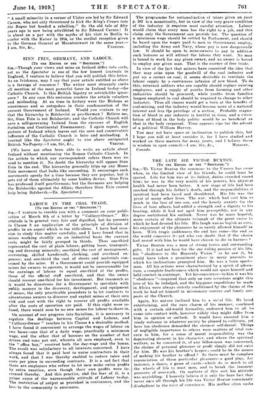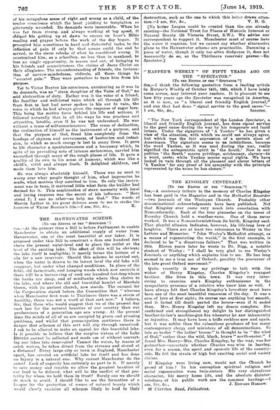THE LATE SIR VICTOR BUXTON. [To THE EDITOR OF THE
" ElrECTATOR."3 Sut,—To Victor Buxton the summons to the Unseen has crone when, in the limited view of his friends, he could least be spared. Life for him Was at its littlest, duties crowded round him; he was in the very zenith of his powers, his phyaieal health had never been hotter. A new stage of life had been reached through his father's death, and the responsibilities it
involved had been faced and shouldered. His life was the pivot of many other lives. The war, which haul cost him se
much in the loss of one son, and the hourly anxiety for the lives of four others, had added a strength and a dignity to his bearing, while it had not aged him perceptibly, nor in any degree embittered his outlook. Never was he more hopeful. more certain of the ultimate triumph of the great cause to which he had devoted his life. His laugh was as boyish as ever. his enjoyment of the pleasures he so rarely allowed himself as keen. With tragic suddenness the end lies come—the end aS the world conceives it—yet a ho can doubt that if the cl '.a had rested with him be would have chosen to die in harness S Victor Buxton was a man of strong tastes and outstanding gifts. If it had not been for the one ruling passion of his life, bis "obedience to the Heavenly Vision " as he saw it, lie would have taken a prominent place in many pursuits to which his inclinations prompted him. He was a born sport,s. man. All his actions were characterized by a spirit of adven- ture, a complete fearlessness which would not spare himeelf and held comfort in contempt. Yet his conscience—to him it was his " obedience "—required that only on rare occasions might this love of his be indulged, and the big-game expeditions he made in Africa were always strictly conditioned by the claims of the work Ile had set himself in missionary centres and lonely out- posts of the Church.
Again, his nature inclined him to a social life. He loved entertaining, and the rare charm of manner, combined
with a certain old-world formality, endeared him to all its came into contact with, however widely they might differ from him in opinion or outlook. It would have ensured him a ready welcome in whatever society he pleased to cultivate, yet here too obedience demanded the sternest self-desist. Things of negligible importance to others were matters of vital con- cern to him, for a sense of moral responsibility was the dominating element in his character. and where the spiritual welfare, as he conceived it, of any fellow-man was concerned, the claims of personal pleasure or profit simply did not exist for him. He was his brother's keeper; could he be the means of making his brother to offend ? So there must be complete renunciation of those particular pleasures—a good play, for instance, a dance, a game of cards—which do so much to ail the wheels of life to most men, and to break the insistent pressure Of overwork. On matters of this sort Ms attitude was unyielding. I honestly believe it it only the bare fact that never once all through his life was Victor Buxton consciously disobedient to the voice of conscience. His mother often spoke of his scrupulous sense of right and wrong as a child, of the tender conscience 'Which the least yielding to temptation so grievously wounded. Its demands were inexorable. When he was far front strong, and always working at top speed, it obliged his getting up at dawn to ensure an hour's Bible reading and prayer before the work of the day began. It prosepted him sometimes to hard and distasteful tasks, to the infliction of pain if only by that means could the end be served, to the stern rebuke of what he considered wrong. It constrained him, as a schoolboy, no lees than in manhood, to lose no single opportunity, in season and out, of bringing to his friends and acquaintances the claims of Jesus Christ on their allegiance. The misunderstanding of friends, the insinua- tion of narrow-mindedness, ridicule, all these things he "counted gain." They were powerless to turn him from his InirPcse Yet to Victor Buxton his conscience, unrelenting as it was in Its demands, was no "stern daughter of the Voice of God," no sold abstraction of duty. Rather was it the voice of a friend. the familiar and well-loved voice which all through his life from first to last had never spoken to his ear in vain, the voice to which he had always given the response of eager love. This being the motive force behind his life and actions, it followed naturally that in all his ways he was gracious and attractive, lovable, even if he was not understood. He was without a trace of self-consciousness. The sense of dedication, the realization of himself as the instrument of a purpose, and that the purpose of God, freed him completely from the bondage of shyness and nervousness, of hesitation and indeci- sion, in which so much energy is lest in many lives. It gave to his character a spontaneousness and a buoyancy which, in spite of its prevailing note of intense seriousness, carried him unscathed through many of the rough places of life. It gave a quality of its own to his sense of humour, which was like a child's, vivid and always fresh. It delighted children, and made them love him.
He was always absolutely himself. There was no need to worry over what people thought of him, what impression he made, what motives they ascribed to bins. So only the instru- ment was in tune, it mattered little what form the builder had devised for it. This combination of stern necessity with loyal and loving response was the secret of his influence. "Here stand I; I can no other—so help me God." The words of Martin Luther in his great defence seem to me to strike the keynote of Victor Buxton's am, Sir, Ac., X.



































 Previous page
Previous page